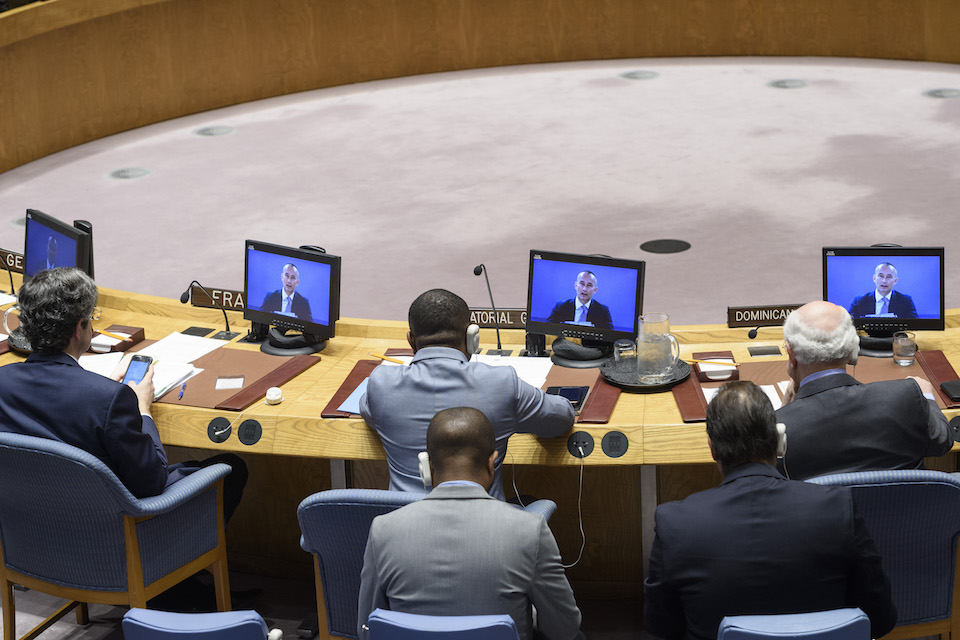Encouraging all parties to work together to achieve peace for Israelis and Palestinians
Statement by Ambassador Jonathan Allen, UK Deputy Permanent Representative to the UN, at the Security Council Debate on the Middle East Peace Process

Thank you Madam President and welcome back to the Security Council. And thank you to Special Coordinator Mladenov and Commissioner-General Krähenbühl for your briefings.
Since the Council’s last monthly meeting on this issue, we have witnessed the worst violence in Gaza since 2014. The United Kingdom was gravely concerned by this escalation, during which both Israeli and Palestinian civilians were killed. We utterly condemn all rocket fire from Gaza towards Israel, and we are clear that it must stop. It is ultimately the ongoing decision by Hamas, to embrace violence and reject the Quartet Principles, which lies at the heart of the Gazan tragedy.
The United Kingdom’s support for Israel’s right to self-defence is unequivocal. But we are equally clear that Israel’s action must be proportionate, and must guard against civilian casualties.
Madam President, we welcome the ceasefire brokered by the UN and Egypt, and support their efforts to maintain calm. We urge all parties to demonstrate restraint and to make progress towards a long-term agreement.
As well as creating fear amongst the Israeli and Palestinian populations, and damaging the prospects for peace, this hopeless cycle of violence further undermines the humanitarian situation in Gaza.
Against this backdrop, UNRWA is a necessary humanitarian and stabilising force in the region, providing vital services to millions of Palestinian refugees. The United Kingdom remains a firmly committed supporter of UNRWA, and of Palestinian refugees across the Middle East, and we will do everything we can to maintain continuity of essential services at this time. Last year, the UK almost doubled our original core support to UNRWA, and over the next two years, the UK will provide the Agency with up to $100 million dollars.
We also recognise the need for UNRWA to reform in order to ensure its sustainability. UNRWA has undertaken significant cost-cutting measures to respond to budget cuts and growing need. We welcome UNRWA’s efforts to broaden its donor base, and we encourage others to step up with more funding and more predictable disbursements.
Madam President, the United Kingdom remains worried about the impact of Israel’s decision to withhold tax revenues from the Palestinian Authority. The Israeli decision will have significant consequences for stability and security; it is impacting ordinary Palestinians and it risks exacerbating the already dire humanitarian and economic situation in Gaza.
The United Kingdom continues to have concerns about aspects of the Palestinian system of payments to detainees. We encourage the reform of the system to be needs-based, transparent and more affordable. But this is not a justification for withholding agreed tax revenues.
A stable Palestinian Authority is in the interest of both Palestinians and Israelis. This is the PA’s money. We encourage Israel to reconsider this decision or find other ways to counteract the risks, while abiding by all signed agreements. Given the risk of fiscal collapse is very real, we also urge the PA to accept the remaining tax revenues.
We welcome the calls made at the Ad Hoc Liaison Committee for enhanced dialogue between the Israeli and Palestinian governments to address the current fiscal crisis, as well as the offers made to assist the parties in addressing the outstanding fiscal issues adequately and urgently.
Madam President, the United Kingdom continues to believe that substantive peace talks between the parties – leading to a negotiated two-state solution based on 1967 lines, with agreed land swaps, with Jerusalem as a shared capital and a just, fair, agreed and realistic settlement for refugees – is the way to end the Arab-Israeli conflict; provide security and justice to both Israelis and Palestinians; and preserve Israel’s Jewish and democratic identity.
I want to thank the representative of the United States for his comments, including on the proposed meetings in Bahrain. We look forward to studying the United States Administration’s proposals for a viable Israeli-Palestinian peace agreement which addresses the legitimate concerns of both parties.
Madam President, to have the best chances of success, the peace process must be conducted in an atmosphere free from violence and we call on all parties to work together to maintain calm.
Thank you.